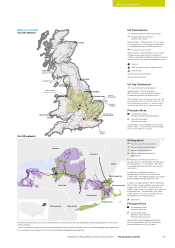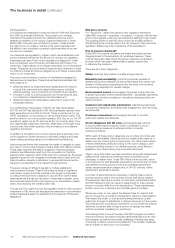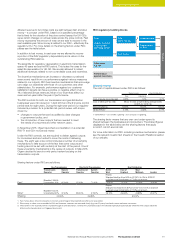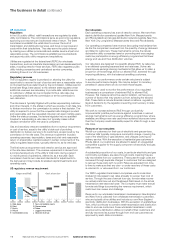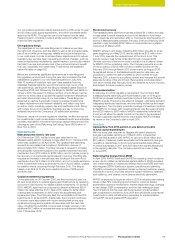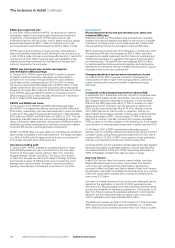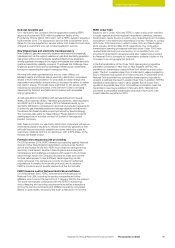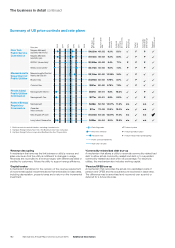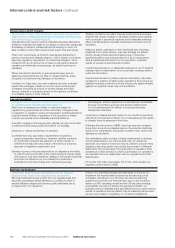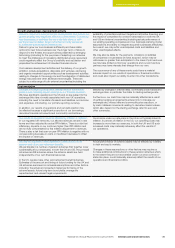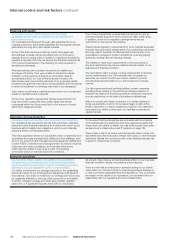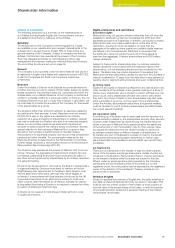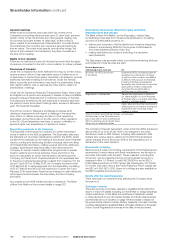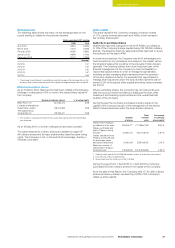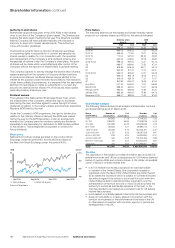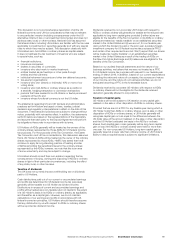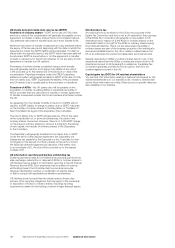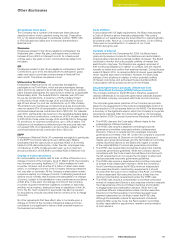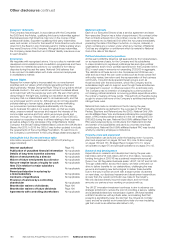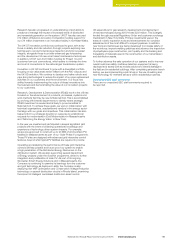National Grid 2016 Annual Report Download - page 187
Download and view the complete annual report
Please find page 187 of the 2016 National Grid annual report below. You can navigate through the pages in the report by either clicking on the pages listed below, or by using the keyword search tool below to find specific information within the annual report.
Growth and business development activity
Failure to respond to external market developments and execute our
growth strategy may negatively affect our performance. Conversely,
new businesses or activities that we undertake alone or with
partners may not deliver target outcomes and may expose us
to additional operational and financial risk.
Failure to grow our core business sufficiently and have viable
options for new future business over the longer term or failure to
respond to the threats and opportunities presented by emerging
technology (including for the purposes of adapting our networks
to meet the challenges of increasing distributed energy resources)
could negatively affect the Group’s credibility and reputation and
jeopardise the achievement of intended financial returns.
Our business development activities and the delivery of our growth
ambition, include acquisitions, disposals, joint ventures, partnering
and organic investment opportunities such as development activities
relating to changes to the energy mix and the integration of distributed
energy resources and other advanced technologies. These are
subject to a wide range of both external uncertainties (including the
availability of potential investment targets and attractive financing and
the impact of competition for onshore transmission in both the UK
and US) and internal uncertainties (including actual performance of
our existing operating companies and our business planning model
assumptions and ability to integrate acquired businesses effectively).
As a result, we may suffer unanticipated costs and liabilities and
other unanticipated effects.
We may also be liable for the past acts, omissions or liabilities
of companies or businesses we have acquired, which may be
unforeseen or greater than anticipated. In the case of joint ventures,
we may have limited control over operations and our joint venture
partners may have interests that diverge from our own.
The occurrence of any of these events could have a material
adverse impact on our results of operations or financial condition,
and could also impact our ability to enter into other transactions.
Cost escalation
Changes in foreign currency rates, interest rates or commodity
prices could materially impact earnings or our financial condition.
We have significant operations in the US and so are subject to the
exchange rate risks normally associated with non UK operations,
including the need to translate US assets and liabilities, and income
and expenses, into sterling, our primary reporting currency.
In addition, our results of operations and net debt position may
be affected because a significant proportion of our borrowings,
derivative financial instruments and commodity contracts are
affected by changes in interest rates, commodity price indices and
exchange rates, in particular the dollar to sterling exchange rate.
Furthermore, our cash flow may be materially affected as a result
of settling hedging arrangements entered into to manage our
exchange rate, interest rate and commodity price exposure, or
by cash collateral movements relating to derivative market values,
which also depend on the sterling exchange rate into euro and
other currencies.
Our results of operations could be affected by inflation or deflation.
In our regulated UK networks, our allowed revenues are set in real
terms and then adjusted for actual RPI inflation. There is a risk that
inflationary impacts on our costs are higher than RPI inflation and
are not fully compensated by this inflation adjustment to revenues.
There is also a risk that year-on-year RPI inflation is negative with no
corresponding decrease in costs or insufficient decrease to offset
the impact on revenues.
Our income under our rate plans in the US is not typically linked to
inflation. In periods of inflation in the US, our operating costs may
increase by more than our revenues. In both the UK and US such
increased costs may materially adversely affect the results of
our operations.
We may be required to make significant contributions to fund
pension and other post-retirement benefits.
We participate in a number of pension schemes that together cover
substantially all our employees. In both the UK and US, the principal
schemes are DB schemes where the scheme assets are held
independently of our own financial resources.
In the US, we also have other post-retirement benefit schemes.
Estimates of the amount and timing of future funding for the UK and
US schemes are based on actuarial assumptions and other factors,
including: the actual and projected market performance of the
scheme assets; future long-term bond yields; average life
expectancies; and relevant legal requirements.
Actual performance of scheme assets may be affected by volatility
in debt and equity markets.
Changes in these assumptions or other factors may require us
to make additional contributions to these pension schemes which,
to the extent they are not recoverable under our price controls or
state rate plans, could materially adversely affect the results of our
operations and financial condition.
Additional Information
185National Grid Annual Report and Accounts 2015/16 Internal control and risk factors


